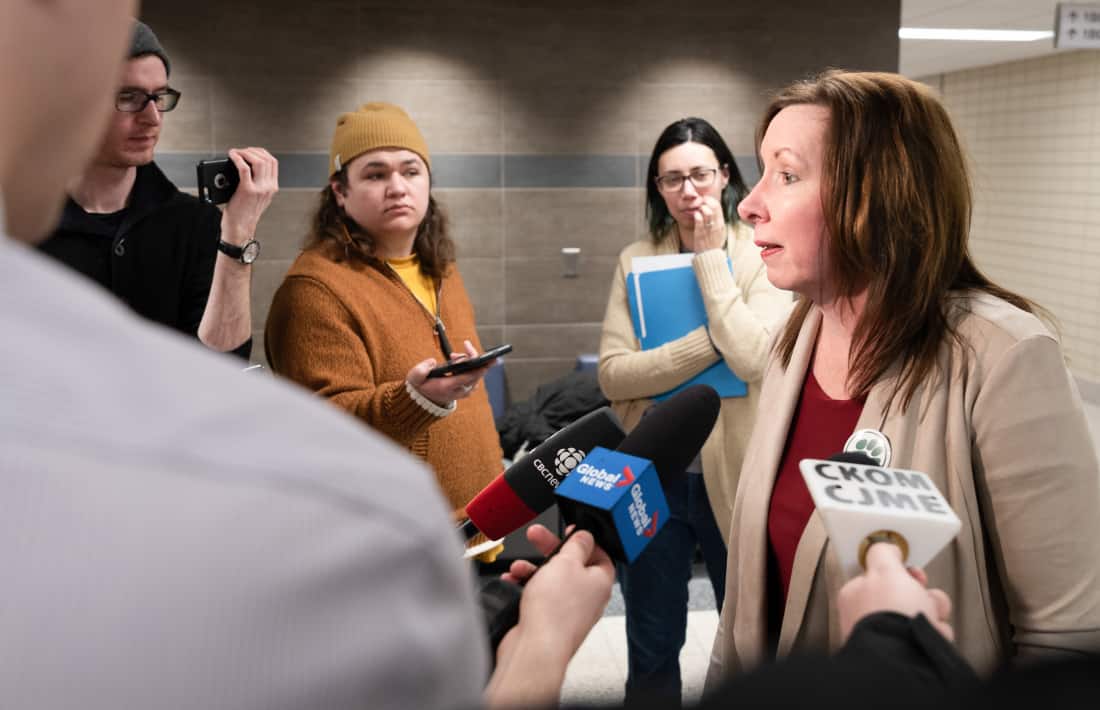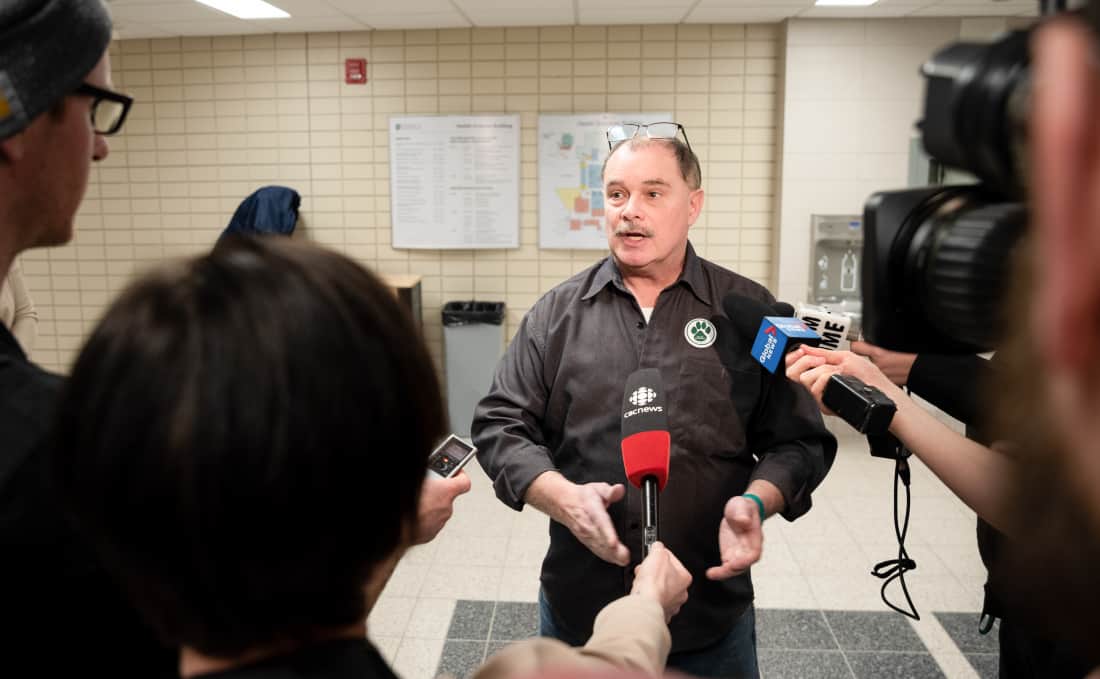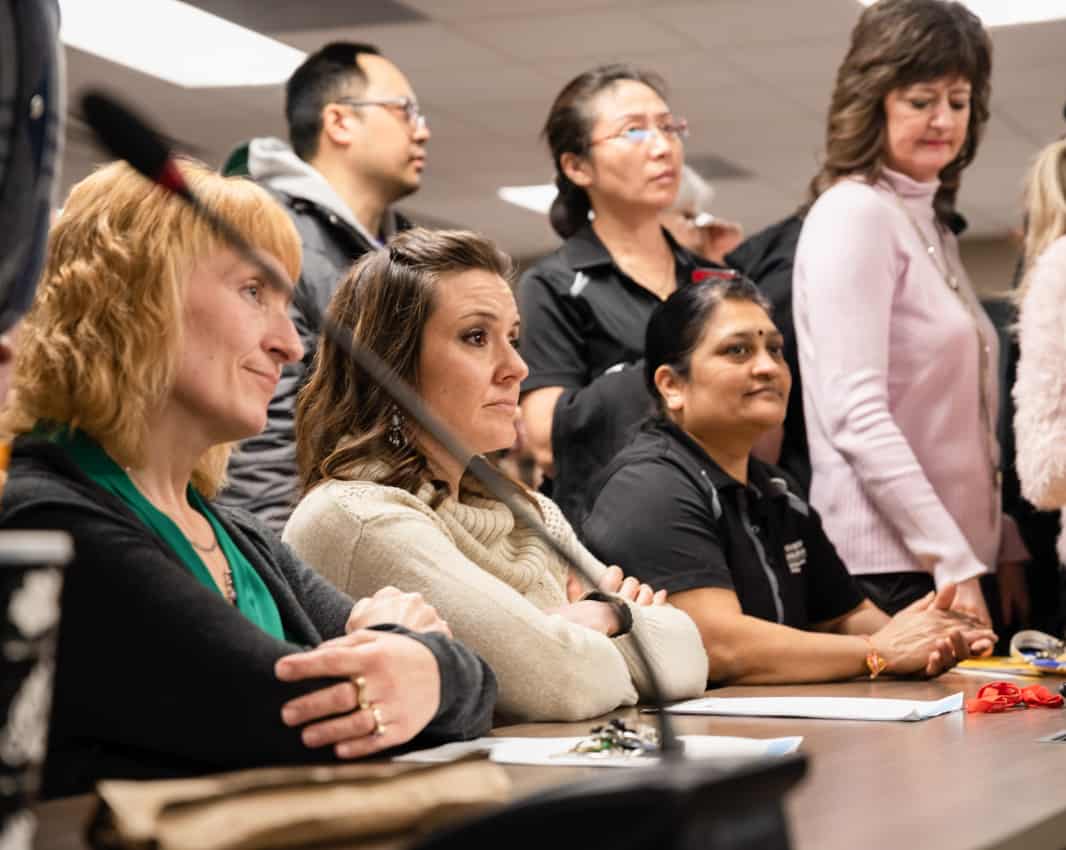
The Canadian Union of Public Employees Local 1975 is creeping further towards its fourth year without a new agreement. One of the few things that appear certain is that neither side of the bargaining table appears prepared to give an inch, but something has to give eventually, right?
The long-running attempts to bargain for a new collective agreement saw a few updates over the week of Feb. 25. These included a few more campus unions getting involved, along with the announcement that a hearing has been scheduled to address one of the applications in front of the Saskatchewan Labour Relations Board.
The first update of the week was a press conference held by CUPE Local 1975 on campus. The conference served as a platform for a number of speakers from CUPE and the Administrative and Supervisory Personnel Association — another bargaining unit for workers at the U of S that resulted from a CUPE expansion in 1976 during which a few members refused membership of CUPE, forming ASPA in 1978.
In addition to updating media outlets on the state of negotiations, the conference was also attended by many members of the Local 1975 who came to hear updates on the negotiations of their pensions and wages.
CUPE Local 1975 talked about their bargaining with the university and reiterated their call to President Peter Stoicheff and the U of S Board of Governors for a meeting. Their call was met with a dismissal through a statement issued by Gord Hunchak, associate vice-president, strategic communications and chief communications officer of the U of S.
“The Board of Governors and senior administration have been kept fully up to date throughout this entire process and are supportive of the direction the university’s bargaining team has taken,” Hunchak said. CUPE national representative Ann Iwanchuk opposes this statement, challenging whether the university administration has been fully kept in the loop.
“We do know that President Stoicheff and the BOG are the decision makers in this situation,” Iwanchuk said in an email to the Sheaf. “We find it difficult to believe that, if they were being kept in the loop, that they would maintain their position.”
Iwanchuk speaks to why they want to meet with Stoicheff and the board outside of the bargaining table and to the history behind these types of meetings.
“It is atypical to have an employer who will not meet with the union leaders,” Iwanchuk said. “The former acting President Barnhart regularly met with the union leaders on campus. It is particularly important to do so when 1,950 people could walk off the job, effectively making the university operations extremely difficult. If I were in that position, I would be willing to do whatever it takes to come to a satisfactory resolution.”
As part of their presence at the CUPE 1975 press conference, ASPA asked that, in the event of a strike, members not volunteer to do the work of CUPE 1975 members. In an email to the Sheaf, ASPA President Joanie Crandall and Vice-Presidents LaVina Watts and Dawn Giesbrecht explain the importance of this position.
“Union bargaining teams are looking to achieve fair wages, fair benefits and fair working conditions for their members,” the ASPA president and vice-presidents said. “It is important to support colleagues in the way ASPA members would wish to be supported if the situation were reversed. Strikes are used by unions only as a last resort when there is an impasse and a fair agreement is not being reached through the bargaining process.”
ASPA’s own collective bargaining agreement expires April 30 of this year. As they prepare for bargaining, the arduous process of the U of S-CUPE 1975 negotiations hang over them. The president and vice-presidents comment on their outlook going in.
“Years ago, collective bargaining between ASPA and the university was known as a gentleman’s agreement,” the ASPA president and vice-presidents said. “The tenor of negotiations has certainly changed since then. It’s become less co-operative and more adversarial.”
The most significant update that occurred during the press conference is that, just as Iwanchuk was about to speak, she informed the crowd that she had just received communication that they would be returning to the bargaining table, which they will be doing on March 15.
On the day following the CUPE 1975 press conference, the U of S Students’ Union released a statement to “express its significant disappointment” that no agreement has been reached between CUPE Local 1975 and the U of S.
Although the statement presents the USSU as a neutral party, the statement was a censure to possible job action as students would be “held to ransom” as bargaining chips. The statement referenced the 2007 CUPE Local 1975 strike to illustrate its concerns, citing the “threat of disruption” for food services, libraries, lab times and more — all services for students.
The statement was posted to the USSU Facebook page, and in the comments, Deena Kapacila, former vice-president operations and finance for the USSU, said that the language used supports the university more than the Local 1975. Kapacila also said that the statement failed to be truly neutral.

In another comment, Kylie Phillips, chair of the University Students’ Council, upheld the union’s position, stating that — since the USSU is not a labour union — they must advocate for the student experience.
Aidan Murphy, fifth-year women and gender studies and political studies double-major and student member of the U of S Senate, took his comments to the USC meeting on Feb. 28. Calling the statement “ineffective,” Murphy had this to say on the 2007 strike, which the USSU statement used as evidence for lost services.
“When CUPE support staff went on strike for an entire month leading to lost services, … the USSU made the choice to remain neutral to simply say ‘we oppose a labour stoppage.’ Without the student union’s support, involvement or pressure, the strike lasted for over a month and students lost these services. Now, we are facing a similar situation, and the USSU is making a similar statement,” Murphy said.
Murphy went on to cite the support from the University of Regina Students’ Union towards the U of R faculty union, stating that this support has given the union leverage in bargaining that could help avoid or mitigate job action. USSU Vice-President Academic Sheldon Moellenbeck says that the maintenance of services is best for students.
“We hope that [a] fair deal can be reached soon to avoid service disruptions that would greatly impact students. As the USSU’s mission is to represent, serve and support undergraduate students, it is our role to advocate for what is best for students,” Moellenbeck said in an email to the Sheaf.
For Iwanchuk, she says that their goal is not to disrupt student services and that they will be meeting with the USSU in the coming weeks.
“We do not want to inconvenience students — we want to achieve a collective agreement,” Iwanchuk said. “If we are forced to take job action, that’s on the university not CUPE Local 1975.”
On the topic of service disruptions, the U of S statement addressed the issue generally.
“In the event of CUPE 1975 taking job action, the university will remain open and classes will continue, and it will be our priority to minimize any disruption to our students and ensure the health and safety of our campus community,” Hunchak said.
An important aspect of these strikes is the possibility of other unions refusing to cross a picket line. Perhaps, the group with the ability to impact students most significantly is the faculty union.
If a strike were to occur, professors would be able to cancel class because their collective agreement protects its members from disciplinary action if supporting the strike of another union on campus. However, they would have a loss in pay for the period when they do not hold classes.

Due to two outstanding applications to the Saskatchewan Labour Relations Board, CUPE 1975 is not in a legal strike position. The purpose of the most recent of these applications is to determine whether the university falls under essential services legislation, which would determine if all members of CUPE Local 1975 are able to strike, should that decision come.
“If the tribunal rules in the university’s favour, then we will be required to negotiate an essential services agreement. In order to have a successful strike, there has to be inconvenience to the employer. How much they are inconvenienced will be determined by how many of our members are required to work,” Iwanchuk said.
This application will require a hearing to settle, which is slated to take place from March 26 to 28. The other outstanding application was made in 2012, and CUPE Local 1975 is waiting to hear if they will be able to withdraw it — which the university is contesting.
The next big dates on this story will be March 15 when bargaining resumes and March 19 when CUPE 1975 is holding a rally in the Bowl during the Board of Governors meeting. As the three days highlighted in this article show, this story is evolving and changing with each passing day.
—
Jack Thompson / Sports & Health Editor
Photos: David Hartman